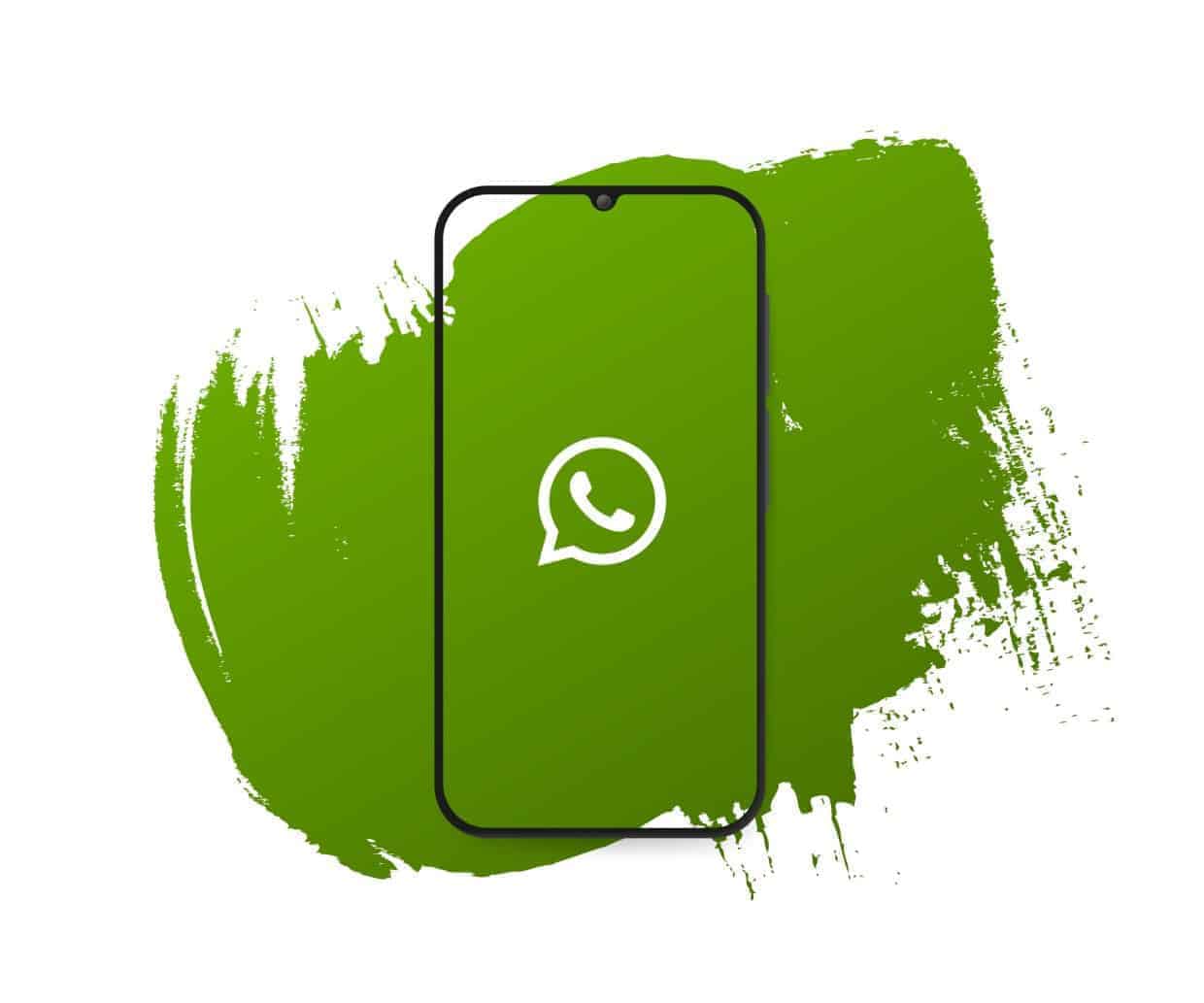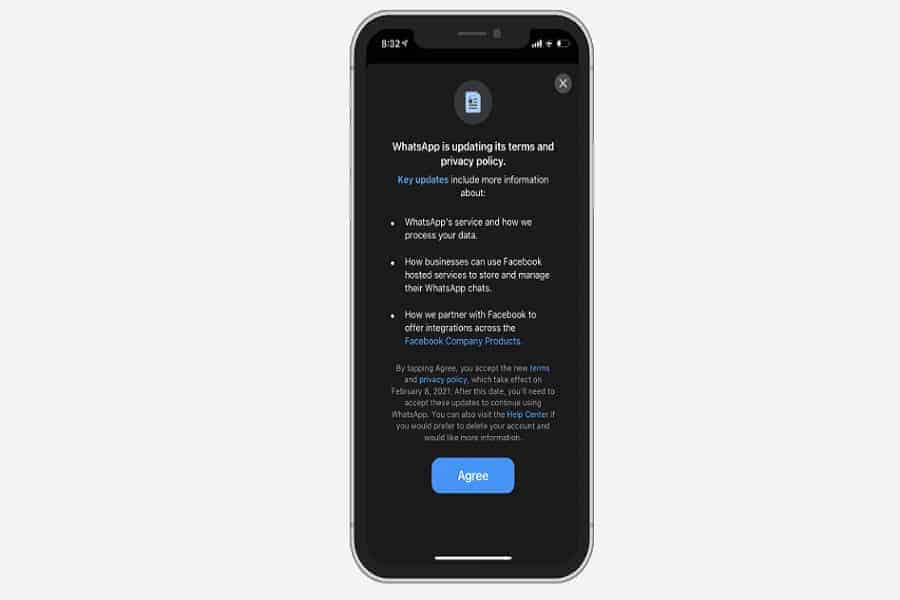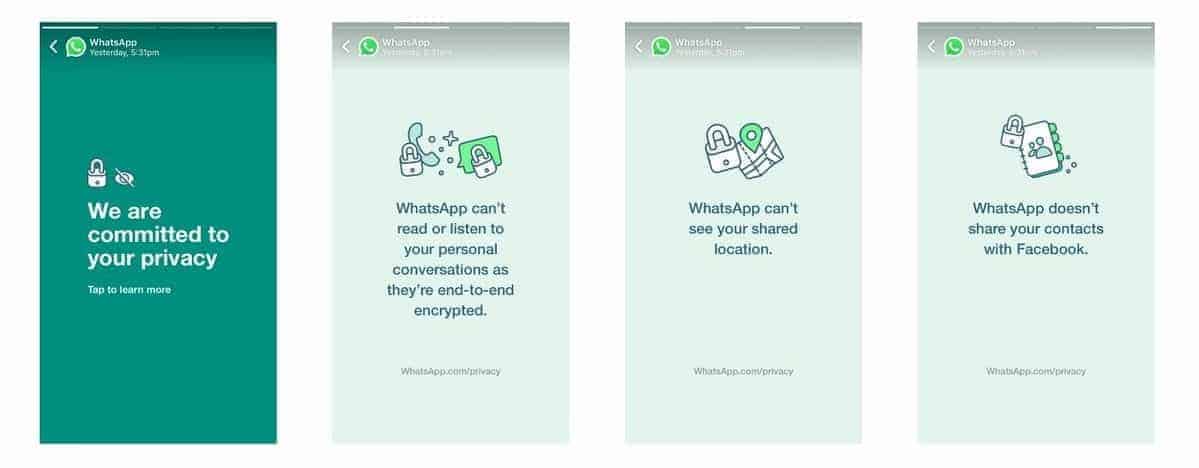In this article we’ll explain what changes with the recent update of WhatsApp’s terms of use
Index
- Why is WhatsApp changing its terms of use?
- WhatsApp is forcing its users to accept the new terms of use: here’s why
- WhatsApp for companies: WhatsApp Business and WhatsApp Business API
- WhatsApp postpones the update of its terms of use for 3 months
- New tools for companies to sell via WhatsApp: here’s what to expect
As we all know, WhatsApp is updating its terms of use and its privacy policy, which must be accepted, otherwise you won’t be able to use the famous instant messaging platform any longer.
Initially, the deadline for accepting the new terms was set for February 8th 2021, but WhatsApp has recently decided to postpone the new rules by three months which means that they will come into force from mid-May.
This is a unilateral contractual modification of the terms that will affect the way the app is used indirectly, meaning in regards to the interaction between WhatsApp and Facebook.
In fact, this update of the terms allows WhatsApp to share its user data with its “Affiliated companies”, primarily Facebook, which will then be able to access the data stored by WhatsApp, including telephone numbers, for a more detailed user profiling.
However, the update will have no effect for EU countries, where very different and often stricter rules apply when it comes privacy protection, thanks to the GDPR, which came into force in 2018.
These new changes will allow the Facebook group to share data cross-platform and launch new tools for companies that want to interact and engage more with their customers.

For some time now, WhatsApp has increasingly become a tool for companies that want to get in touch with their target audience. Moreover, even users expect to be able to use WhatsApp as a communication channel to reach their favorite brands.
Precisely to facilitate companies, WhatsApp has launched the corporate versions of the platform: WhatsApp Business and WhatsApp Business API. These are solutions that allow companies, based on their needs, to interact through the famous app.
In particular, WhatsApp’s Business APIs allow you to connect WhatsApp to an external platform, for a more structured management of the chats activated with users.
One of the reasons why WhatsApp is forcing users to accept the new terms of use is precisely this: to inform them that their chats could be managed by external platforms, outside the Facebook/WhatsApp environment.
In general, in order to access WhatsApp’s Business API you must request Facebook’s approval, or the approval by one of the providers selected by Facebook itself. To understand what are the differences featured in the WhatsApp Business version, we invite you to read the next paragraph.
As already mentioned, the two solutions are designed for companies that wish to obtain greater control of their communications through the famous messaging app.
The WhatsApp Business version is the free version offered to SMEs, and it allows companies to enter company information, integrate a product catalog, and add user tags.
Unfortunately, the default platform of WhatsApp Business has several limitations, including that of not being able to be used on multiple devices at the same time. It is therefore more suitable for companies that have few chats.
On the other hand, WhatsApp’s Business APIs, are made up of access keys that allow external platforms to access WhatsApp information, and make it possible to manage a greater number of chats, as well as many other features.
This solution is designed for large companies that want to use a single WhatsApp account, and structure a sales or support team that can therefore respond to numerous chats from the same WhatsApp number.
With the Callbell platform you can use the multi-agent feature on WhatsApp, and access numerous tools specifically designed to optimize incoming chats, both from WhatsApp and all the leading instant messaging apps.

Some Italian regulatory bodies wasted no time, and promptly expressed their doubts to the European Data Protection Board. Their concerns relate to the lack of clarity regarding the data that could be shared with third parties.
According to the Italian privacy guarantor, there would be not be enough time for users to clearly understand what kind of data processing will actually be carried out after the expected deadline.
Also Indian authorities have openly requested to postpone the obligation to accept the terms, to give citizens and public bodies the opportunity to understand what the implications of the new WhatsApp rules may be.
These political-based pressures led the Facebook group to postpone the obligation to accept the new terms and conditions by 3 months. The new deadline for acceptance is set for May 15th, 2021.
But WhatsApp’s news for 2021 do not end here: the messaging giant is in fact launching new tools that will be very useful for companies and for users who want to exchange messages.
One of the main addition will consist in the shopping button, which will allow users to purchase goods or services directly via chat. However, it is not yet clear how it will be possible to make payments within the app.
The catalogs, already present in the WhatsApp Business version, will be enriched with the new APIs, which aim at assimilating Instagram Shopping and encourage users to immediately purchase the products offered by the brands.
Finally, non-business users will be able to benefit from further additions: video calls from WhatsApp Web, and the so-called vacation mode, with which unwanted chats can be moved to a special archive.

About the author: Hello! I am Alan and I am the marketing manager at Callbell, the first communication platform designed to help sales and support teams to collaborate and communicate with customers through direct messaging applications such as WhatsApp, Messenger, Telegram and Instagram Direct




